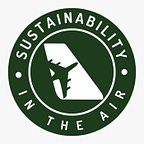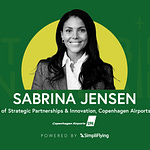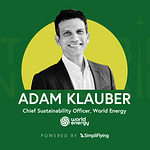In this episode of our ‘Sustainability in the Air’ podcast, Hiske Arts, Campaigner at Fossil Free Netherlands (Fossielvrij NL), speaks with SimpliFlying CEO Shashank Nigam and discusses the climate activists’ scepticism about the aviation industry’s commitment to addressing climate concerns.
Fossielvrij NL is a Dutch citizens’ movement seeking to break the power of the fossil fuel industry. They seek to build a strong, community-based movement, and enable a fast and just transition toward 100% renewable energy.
As a strong but powerful movement, Fossielvrij NL has been instrumental in ensuring that prominent public institutions – like the Van Gogh Museum and ABP (Europe’s largest pension fund) – cut ties with oil, coal and gas companies. In 2022, Fossielvrij NL, supported by ClientEarth and Reclame Fossielvrij, filed a groundbreaking ‘greenwashing’ lawsuit against Dutch airline KLM over its “Fly responsibly” campaign.
Here are the key highlights of the conversation:
Climate activism and aviation industry emissions. (4:35)
Carbon budget and the IPCC reports (6:58)
Is the 2% emissions argument valid? (10:51)
Airline industry’s green marketing tactics and their impact on climate action (18:30)
Is all flying bad? (30:07)
Reducing air travel emissions and finding alternatives (33:17)
Aviation industry sustainability and hope for the future (45:30)
Rapid fire! (49:24)
Keep reading for a quick overview of the episode.
Why climate science matters
Arts stresses the importance of heeding the warnings of climate scientists due to the pressing and evident impacts of climate change we witness today, such as floods, heatwaves, and wildfires. These disasters are undeniable manifestations of the changing climate, and no one can turn a blind eye to their reality any longer.
The next few decades are pivotal for taking action. Though we are already partway into the critical decade for action, the current rate of emissions, particularly from the aviation industry, threatens our carbon budget.
To ensure global temperatures do not rise above 1.5 degrees, immediate measures need to be taken. If no changes are made, the carbon budget for keeping temperatures below 1.5 degrees will be exhausted in six years.
Moreover, the scientific community, represented by groups like the IPCC, has presented comprehensive evidence that even a rise of 1.5 to 2 degrees in global temperatures can have dire consequences. Current and anticipated impacts of climate change pose a severe threat, especially to those living in coastal areas. The potential of reaching climatic tipping points, which could hasten these changes even further, is a serious concern.
“If we want to be really certain that we will stay under two degrees of warming, we will be without any carbon budget in less than 18 years if we stay on this path of emissions. But the aviation industry is still growing. And I would ask them: how is this possible?”
5 insights from climate activists about the aviation industry
1. Is the 2% emissions argument valid?
When faced with criticism from climate activists, one of the most common arguments posed in defence of aviation is that it accounts for a mere 2% of the global CO2 emissions. Arts, however, points out that according to the ICCT, the figure stands much higher at 2.9%, when considering the global well-to-wake CO2 emissions, and does not include aviation’s non-CO2 impacts.
Unlike other fossil-fuel-heavy sectors, aviation lacks feasible ways to become sustainable. Arts believes that this leads the industry to claim that aviation is a hard-to-abate sector, which is unfairly targeted by activists. She adds that aviation isn’t a selective target – climate action is against the fossil fuel industry and its excessive consumption at large. The major issue with aviation in Arts’ opinion lies in the fact that it’s hard to regulate.
“Because it’s so difficult to make aviation sustainable, the industry tends to say aviation is hard to abate. So leave us alone. But I don’t think that’s true. It’s not really hard to abate, it’s hard to regulate. And I think if we start regulating the aviation industry, then [it] can be aligned with peers.”
2. Why honest storytelling is important
Arts believes that the airline industry has taken over the tactics of the fossil fuel industry to mislead consumers and greenwash their claims. Since aviation is likely to continue being a consumer of fossil fuels, misguided “green” advertising deceives the public and most importantly, delays climate action.
Honest storytelling and genuine claims about products and services should be the basis of advertising, Arts states. Recently, Fossielvrij NL had filed a ‘greenwashing’ lawsuit against Dutch airline KLM over its “Fly responsibly” campaign. False advertising, she adds, deters consumers from making climate-conscious decisions and governments from enforcing requisite regulations. Such ads also give the aviation industry a “licence to grow”, and as long as that happens, climate goals cannot be met, she adds.
“If we believe in the green talk of the aviation industry, then we don’t demand the regulation of the aviation industry… then people get on a plane because they don’t realise how big the problem is, of flying.”
3. Is all flying bad?
Arts is cognizant of the benefits of flying and insists on getting rid of only the unnecessary flights. For example, flights that deliver essential commodities like medicines and trips to families in far-off places cannot be avoided, she admits.
“Of course, we need flying, but we have to find alternatives for all the unnecessary flights… to make sure that we have the carbon budget left for flying that is necessary”
She states that the aviation industry heavily promotes business flying, which emits far more CO2 than its economy equivalent. The added comfort of the business class seats makes it a very appealing option for travellers.
Moreover, loyalty programmes that reward frequent flyers further incentivise people to take more flights and add to the already high emissions stockpile.
Targeting these two aspects, and getting rid of short-haul flights where train alternatives exist, will bring down quite a bit of the emissions, Arts adds. She welcomes France’s recent ban on short-haul flights but cautions against the possibility of an increase in long-haul trips.
4. The Global North’s responsibility
The bulk of growth in aviation is likely to come from developing countries in the Global South. Hence, the responsibility of taking necessary mitigation measures is shifted onto these developing countries, which are expected to limit their growth.
Arts asserts that the Global North has historically reaped the benefits of unparalleled growth by spending its share of the carbon budget.
Since the impacts of climate change will be worse for the poor and marginalised, the developed world has a responsibility to support them. It is therefore imperative for the developed countries to take the first steps and lead climate action.
5. Finding common ground with activists
Arts acknowledges the aviation industry’s efforts towards a sustainable future, especially developments like electric and hydrogen planes. However, she is quick to add that such innovations are marred by the industry’s relentless pursuit of growth.
Working together is imperative in the era of climate emergency. To find common ground with activists, Arts believes airlines should focus on reducing pollution, allow the industry to be better regulated, and support efforts to lobby for taxes on fossil fuels.
The fight after all is against the prevalent unjust system, and not the people working for the airlines, she adds.
‘Sustainability in the Air’ is the world’s leading podcast dedicated to sustainable aviation. Through in-depth conversations with top aviation leaders, we break through the clutter and provide a clear roadmap for a net-zero future.
















